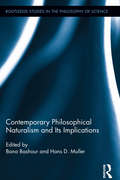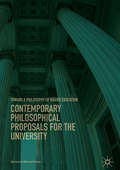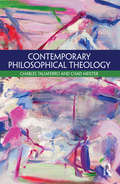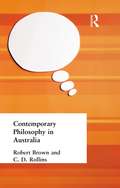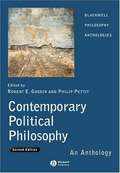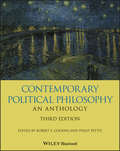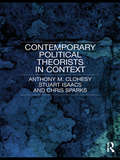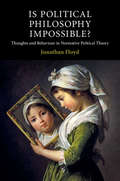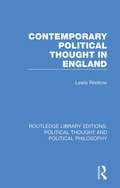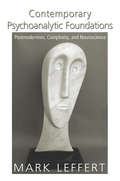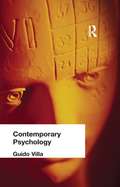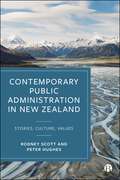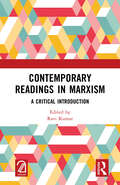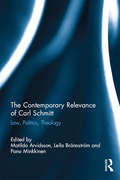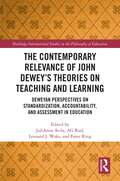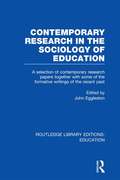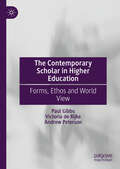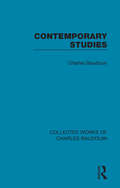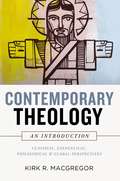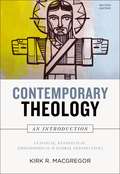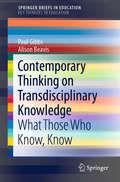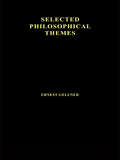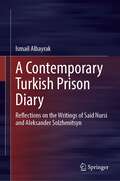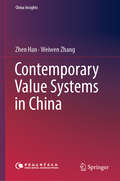- Table View
- List View
Contemporary Philosophical Naturalism and Its Implications (Routledge Studies in the Philosophy of Science)
by Bana Bashour Hans D. MullerOne of the most pervasive and persistent questions in philosophy is the relationship between the natural sciences and traditional philosophical categories such as metaphysics, epistemology and the mind. Contemporary Philosophical Naturalism and Its Implications is a unique and valuable contribution to the literature on this issue. It brings together a remarkable collection of highly regarded experts in the field along with some young theorists providing a fresh perspective. This book is noteworthy for bringing together committed philosophical naturalists (with one notable and provocative exception), thus diverging from the growing trend towards anti-naturalism. The book consists of four sections: the first deals with the metaphysical implications of naturalism, in which two contributors present radically different perspectives. The second attempts to reconcile reasons and forward-looking goals with blind Darwinian natural selection. The third tackles various problems in epistemology, ranging from meaning to natural kinds to concept learning. The final section includes three papers each addressing a specific feature of the human mind: its uniqueness, its representational capacity, and its morality. In this way the book explores the important implications of the post-Darwinian scientific world-view.
Contemporary Philosophical Proposals for the University
by Aaron Stoller Eli KramerThis edited collection brings together a robust range of philosophers who offer theoretically and critically informed proposals regarding the aims, policies, and structures of the university. The collection fills a major gap in the landscape of higher education theory and practice while concurrently reviving a long and often forgotten discourse within the discipline of philosophy. It includes philosophers from across the globe representing disparate philosophical schools, as well as various career stages, statuses, and standpoints within the university. There is also a diversity in method, approach and style, which varies from personal narratives and case studies, to philosophical genealogies, to traditional philosophical essays, and to systematic theories. The collection can serve as a theoretical resource for critically minded administrators and faculty who wish to analyze and change policies and structures at their home institutions. It will introduce them to a wide range of possible educational imaginaries, as well as provide them with productive suggestions for pragmatic change on campuses.
Contemporary Philosophical Theology
by Charles Taliaferro Chad MeisterIn Contemporary Philosophical Theology, Charles Taliaferro and Chad Meister focus on key topics in contemporary philosophical theology within Christianity, Islam, and Judaism, as well as Hinduism and Buddhism. The volume begins with a discussion of key methodological tools available to the philosophical theologian, such as faith and reason, science and religion, revelation and sacred scripture, and authority and tradition. The authors use these tools to explore subjects including language, ineffability, miracles, evil, and the afterlife. They also grapple with applied philosophical theology, including environmental concerns, interreligious dialogue, and the nature and significance of political values. A concluding discussion proposes that philosophical theology can contribute to important reflections and action concerning climate change.
Contemporary Philosophy in Australia
by Brown, Robert and Rollins, C DFirst published in 2002. Routledge is an imprint of Taylor & Francis, an informa company.
Contemporary Political Philosophy: An Anthology
by Robert E. Goodin Philip PettitThis authoritative collection of the seminal texts in post-war political philosophy has now been updated and expanded. Reprints key articles, mainly unabridged, touching upon the nature of the state, democracy, justice, rights, liberty, equality and oppression. Includes work from politics, law and economics, as well as from continental and analytic philosophy. Now includes thirteen additional texts, taking account of recent developments in the field and reflecting the most pressing concerns in international affairs. Can be used alongside A Companion to Contemporary Political Philosophy (Blackwell Publishing, 1993; second edition in preparation) as the basis for a systematic introduction to the subject.
Contemporary Political Philosophy: An Anthology (Blackwell Philosophy Anthologies #1)
by Robert E. Goodin Philip PettitThe revised and updated edition of Goodin and Pettit’s highly-acclaimed contemporary political philosophy anthology, bringing together the field’s most important readings in a single volume Unparalleled in the breadth and scope of its coverage, this newly-revised third edition traces the evolution of political philosophy as a contemporary practice, and raises important questions about the impact of current political events. Fully updated to include 49 contemporary and classic selections from the most distinguished scholars in political philosophy Offers expanded coverage of international affairs and political oppression Includes essays which represent a diversity of political and ideological positions, and features interdisciplinary voices in politics, law, and economics Edited by two of the field’s most highly-respected scholars The ideal collection of primary readings to accompany the Companion to Contemporary Political Philosophy, Second Edition (Wiley Blackwell, 2012) for coursework in political philosophy
Contemporary Political Theorists in Context
by Anthony M. Clohesy Chris Sparks Stuart IsaacsThis exciting new textbook presents a clear framework for students to understand how themes and issues in political thought have emerged and developed throughout the 20th Century. Charting the progression from the preoccupation with the boundaries of the modern state, through to the current debates on rights, identity and justice; the three sections of the book enable the ideas of significant political thinkers to unfold through a telling of the key political events that gave a social context for their thought: Section I: The Inter-War Debate: Weber, Gramsci and Schmitt Section II: Post-War Debates: Arendt, Oakeshott, De Beauvoir and Adorno Section III: Contemporary Debates: Rawls, Nozick, Kymlicka and Foucault Written in an accessible and concise format, features include: 'rewind' and 'fast-forward' indicators to easily guide students around the text discussion points, revision notes and further reading in each chapter informative text boxes to highlight key concepts, people and events. By exploring an often ignored relationship in political thought, the influence of thought upon historical change and the influence of historical change upon theory, this text delivers new and exciting angles from which to approach politics today. Contemporary Political Theorists in Context is essential reading for all students of social and political theory.
Contemporary Political Theory: Thoughts and Behaviour in Normative Political Theory (Contemporary Political Theory)
by Jonathan FloydPolitical philosophy seems both impossible to do and impossible to avoid. Impossible to do, because we cannot agree on a single set of political principles. Impossible to avoid, because we're always living with some kind of political system, and thus some set of principles. So, if we can't do the philosophy, but can't escape the politics, what are we to do? Jonathan Floyd argues that the answer lies in political philosophy's deepest methodological commitments. First, he shows how political philosophy is practiced as a kind of 'thinking about thinking'. Second, he unpicks the different types of thought we think about, such as considered judgements, or intuitive responses to moral dilemmas, and assesses whether any are fit for purpose. Third, he offers an alternative approach - 'normative behaviourism' - which holds that rather than studying our thinking, we should study our behaviour. Perhaps, just sometimes, actions speak louder than thoughts.
Contemporary Political Thought in England (Routledge Library Editions: Political Thought and Political Philosophy #50)
by Lewis RockowFirst published in 1925. This book is a brief analysis of the historical relation of contemporary writers to their immediate predecessors. The author attempts to further a comprehensive summary of certain selected writers, with a criticism of their ideas, while in the last chapter an attempt is made at synthesis. Among those whose work is examined are Ramsay MacDonald, Bertrand Russell, Harold Laski, the Pauls, Hobhouse, Bryce, G. D. H. Cole, Norman Angell, etc. This title will be of great interest to students of politics, philosophy and history.
Contemporary Psychoanalytic Foundations: Postmodernism, Complexity, and Neuroscience
by Mark LeffertPast scholars have tried to classify psychoanalysis as an intrinsically positivist science, with varying degrees of success. Their critics have fared little better with narrow applications of postmodern thought, which focus on smaller areas within psychoanalysis and, as a result, neglect the evolution of the discipline as a whole. In an effort to provide a ground for current psychoanalytic thought, Mark Leffert creates an interreferential schema which balances the influences of postmodernism, complexity theory, and neuroscience as its key factors. Using the heterogeneity of postmodern thought as a starting point, he traces its impact on and implications for the development of the discipline, leading into the realm of complexity theory – which is relatively new to the psychoanalytic literature – and how it informs as well as constrains certain psychoanalytic assumptions. The book then turns to neuroscience, the "hard" scientific study of the complexities of the brain, and how recent research informs psychoanalytic theory and may shed light on aspects of memory, the conscious, and the unconscious. Taken together, these three elements create a firm basis for the current trends in psychoanalysis and the direction of its development in the years to come.
Contemporary Psychology
by Guido VillaFirst published in 2002. Routledge is an imprint of Taylor & Francis, an informa company.
Contemporary Public Administration in New Zealand: Stories, Culture, Values
by Rodney Scott Peter HughesThis book provides an up-to-date account of New Zealand public administration, including insider stories of leading reform. Hailed for its distinctiveness and high performance, New Zealand’s radical public service reforms of the 1980s were studied, praised, criticised, and emulated around the world. However, New Zealand has not stood still. The 80s model had tremendous strengths, reducing some problems but also creating new problems and exacerbating others. More recent reforms layered cultural and behavioural approaches on top of earlier changes. This book, co-authored by the former head of the New Zealand public service, describes decades of change, what worked, what didn’t, and what challenges remain.
Contemporary Readings in Marxism: A Critical Introduction
by Ravi KumarThis volume straddles between being a compilation of chapters exploring the fundamental conceptual categories within Marxism while engaging with those categories at the same time demonstrating the dynamic ability of the Marxian theoretical paradigm to evolve. Challenging the misinterpretation of Marxian theory as rigid, deterministic and outdated it shows how the concepts used by the framework become relevant tools for understanding and analysing society. Divided across two parts the volume grounds the Marxian concepts in a concrete historico-material context of India. It will be an important source for any student interested in social theory in general and Marxism in particular.
The Contemporary Relevance of Carl Schmitt: Law, Politics, Theology
by Panu Minkkinen Matilda Arvidsson Leila BrännströmWhat does Carl Schmitt have to offer to ongoing debates about sovereignty, globalization, spatiality, the nature of the political, and political theology? Can Schmitt’s positions and concepts offer insights that might help us understand our concrete present-day situation? Works on Schmitt usually limit themselves to historically isolating Schmitt into his Weimar or post-Weimar context, to reading him together with classics of political and legal philosophy, or to focusing exclusively on a particular aspect of Schmitt’s writings. Bringing together an international, and interdisciplinary, range of contributors, this book explores the question of Schmitt’s relevance for an understanding of the contemporary world. Engaging the background and intellectual context in which Schmitt wrote his major works – often with reference to both primary and secondary literature unavailable in English – this book will be of enormous interest to legal and political theorists.
The Contemporary Relevance of John Dewey’s Theories on Teaching and Learning: Deweyan Perspectives on Standardization, Accountability, and Assessment in Education (Routledge International Studies in the Philosophy of Education)
by JuliAnna ÁvilaThrough expert analysis, this text proves that John Dewey’s views on efficiency in education are as relevant as ever. By exploring Deweyan theories of teaching and learning, the volume illustrates how they can aid educators in navigating the theoretical and practical implications of accountability, standardization, and assessment. The Contemporary Relevance of John Dewey’s Theories on Teaching and Learning deconstructs issues regarding accountability mechanisms, uniform assessment systems, and standardization processes through a Deweyan lens. Connecting the zeitgeist of the era from which Dewey’s ideas emerged and current global political, social, and economic contexts, the book emphasizes the importance of resilient systems in reconciliating the tension between standardized assessments and individual student development. Contributors provide insights from a range of settings across Pre-K, primary, secondary, and higher education and address topics including teacher agency, voice, leadership, and democracy. The volume will be of interest to scholars, researchers, and academics with an interest in philosophy of education, education policy and the impact of neoliberal agendas, as well as teaching and learning more broadly.
The Contemporary Relevance of John Dewey’s Theories on Teaching and Learning: Deweyan Perspectives on Standardization, Accountability, and Assessment in Education (Routledge International Studies in the Philosophy of Education)
by JuliAnna ÁvilaThrough expert analysis, this text proves that John Dewey’s views on efficiency in education are as relevant as ever. By exploring Deweyan theories of teaching and learning, the volume illustrates how they can aid educators in navigating the theoretical and practical implications of accountability, standardization, and assessment. The Contemporary Relevance of John Dewey’s Theories on Teaching and Learning deconstructs issues regarding accountability mechanisms, uniform assessment systems, and standardization processes through a Deweyan lens. Connecting the zeitgeist of the era from which Dewey’s ideas emerged and current global political, social, and economic contexts, the book emphasizes the importance of resilient systems in reconciliating the tension between standardized assessments and individual student development. Contributors provide insights from a range of settings across Pre-K, primary, secondary, and higher education and address topics including teacher agency, voice, leadership, and democracy.The volume will be of interest to scholars, researchers, and academics with an interest in philosophy of education, education policy and the impact of neoliberal agendas, as well as teaching and learning more broadly.
Contemporary Research in the Sociology of Education (Routledge Library Editions: Education)
by John EgglestonThe subject matter of this book – what happens in schools, the effects of curriculum change, the reasons why some children are successful and others are not – explains just why the sociology of education is one of the most important areas to achieve political importance. There are five sections to the book covering: Educational Achievement; Educational Provision; The Organization of the School; Roles in the School and Values and Learning. The editor discusses the implications of the material presented (much of which was available for the first time when this book was originally published).
The Contemporary Scholar in Higher Education: Forms, Ethos and World View
by Andrew Peterson Paul Gibbs Victoria De RijkeThis book examines what a scholar looks and feels like in contemporary times. It suggests that scholars are more than people employed as academics and discusses how different world ideologies, cultures and systems view their scholars and how they might be considered in the changing and challenging nature of higher education. The book includes discussion from Islamic, Confucian, postcolonial and post-Soviet perspectives, alongside other approaches such as the scholar-artist, thinker, teacher and activist. It will appeal to students and scholars working in the philosophy of higher education, higher education practice and comparative studies.
Contemporary Studies (Collected Works of Charles Baudouin)
by Charles BaudouinOriginally published in 1924, this title is divided into four parts, each looking at contemporary issues. Beginning with ‘The Liberators of the Mind’, the author discusses important thinkers of the time, such as Tolstoy and Nietzsche. The second part looks at ‘The War and the Peace’, which refers to the recently fought First World War. He then moves on to ‘Education and Society’, where discussions include Bahaism and Father Christmas. The final part looks at ‘Art and Criticism’, discussing the trends of French post-war poetry – realism, symbolism and dynamism – followed by a look at dynamic drawing. This volume is available again after many years out of print.
Contemporary Theology: Classical, Evangelical, Philosophical, and Global Perspectives
by Kirk R. MacGregorAccessible and comprehensive, Contemporary Theology: An Introduction by professor and author Kirk R. MacGregor provides a chronological survey of the major thinkers and schools of thought in modern theology in a manner that is both approachable and intriguing.Unique among introductions to contemporary theology, MacGregor includes:Evangelical perspectives alongside mainline and liberal developmentsThe influence of philosophy and the recent Christian philosophical renaissance on theologyGlobal contributionsRecent developments in exegetical theologyThe implications of theological shifts on ethics and church lifeContemporary Theology: An Introduction is noteworthy for making complex thought understandable and for tracing the landscape of modern theology in a well-organized and easy-to-follow manner.
Contemporary Theology: Classical, Evangelical, Philosophical, and Global Perspectives
by Kirk R. MacGregorAccessible and comprehensive, Contemporary Theology: An Introduction by professor and author Kirk R. MacGregor provides a chronological survey of the major thinkers and schools of thought in modern theology in a manner that is both approachable and intriguing.Unique among introductions to contemporary theology, MacGregor includes:Evangelical perspectives alongside mainline and liberal developmentsThe influence of philosophy and the recent Christian philosophical renaissance on theologyGlobal contributionsRecent developments in exegetical theologyThe implications of theological shifts on ethics and church lifeContemporary Theology: An Introduction is noteworthy for making complex thought understandable and for tracing the landscape of modern theology in a well-organized and easy-to-follow manner.
Contemporary Thinking on Transdisciplinary Knowledge: What Those Who Know, Know (SpringerBriefs in Education)
by Paul Gibbs Alison BeavisHow can we understand what a transdisciplinary (TD) approach might actually comprise of, given its complex and various uses? This book asks the question of leading practitioners in the field of higher education and transdisciplinarity. The emergence of transdisciplinarity has been a response to the often-failed closed-system, discipline-based approaches to solving complex social problems (various reports and definitions may be found in projects reported by the OECD, UNESCO and EU). These failures are often contingent upon disaggregated notions of epistemology and the compounding failures of ontological incongruities that are evident in these discipline-based approaches. Such approaches are not necessarily confined to large, seemingly insurmountable social problems, but apply equally well to issues in educational institutions as workplaces. Transdisciplinary knowledge is in the liberation of new and imaginative understanding of the structured reality of open social systems. It gives rise to generative mechanisms, which are central to relationships of agency and structure.
Contemporary Thought and Politics
by Ernest GellnerGellner's political philosophy in these volumes combines the down-to-earth realism of political sociology with a rational treatment of the normative issues of traditional political thought. In these essays Gellner strives to understand the religions of nationalism, communism and democracy, returning again and again to the basic values of the liberal: social tolerance, rational criticism, human decency and justice.
A Contemporary Turkish Prison Diary: Reflections on the Writings of Said Nursi and Aleksander Solzhenitsyn
by Ismail AlbayrakThis book explores the religious experiences of two notable figures who endured severe trials under authoritarian regimes: Bediuzzaman Said Nursi (1877–1960) within the Islamic tradition, and Aleksander Solzhenitsyn (1918–2008) within the Russian Orthodox Christian tradition. Against the tumultuous backdrop of the twentieth century’s spiritual, social, political, and intellectual upheavals, both Nursi and Solzhenitsyn grappled with immense hardships because of their beliefs. Despite immense tribulations, both individuals demonstrated unwavering faith and resilience in the face of adversity, continuing their scholarly and literary activities. The current study centers on the dichotomy of spiritual confinement and expansiveness, illustrating how people can experience spiritual distress even without physical restraints. It explores the historical and conceptual aspects of imprisonment within Christian and Muslim perspectives, explores the reasons for Nursi and Solzhenitsyn's incarceration, examines their coping mechanisms in the face of hardship, and underscores the role of faith and spirituality. The author integrates personal experiences, particularly his own incarceration during the aftermath of the 2016 Turkish staged coup attempt, within the context of the narratives of Nursi and Solzhenitsyn. The book addresses court proceedings, release, departure from Turkey, and resettlement in Australia. Throughout, the author draws parallels between their own observations and those of Nursi and Solzhenitsyn, contributing to the broader discourse on individual spirituality and collective consciousness. The book offers insights into spiritual resilience in the face of adversity, utilizing the lives of these figures to illuminate shared human experiences. A unique collation of personal narration and scholarly reflection, it is relevant to academics and students in history, political science, sociology, Islamic and Middle Eastern studies, and to social scientists researchingthe phenomenon of exile and prison in different countries across the world. It also speaks to the work of activists and policymakers in human rights.
Contemporary Value Systems in China (China Insights)
by Zhen Han Weiwen ZhangThis work illustrates China’s values and how they are practiced. After introducing readers to the theories, systematical structure, historical status, and influence of traditional Chinese values, it points out major developmental trends in connection with modernization. Further, it explores the significance of the contemporary reconstruction of Chinese values and argues that these values can be divided into three layers: values-based goals of national development, Chinese values concepts, and norms of values in a civil society. On this basis, it subsequently interprets the core socialist values “Prosperity, Democracy, Civility and Harmony,” the value concepts “Freedom, Equality, Justice and Rule of Law” and values-based norms “Patriotism, Dedication, Integrity and Friendship.”
